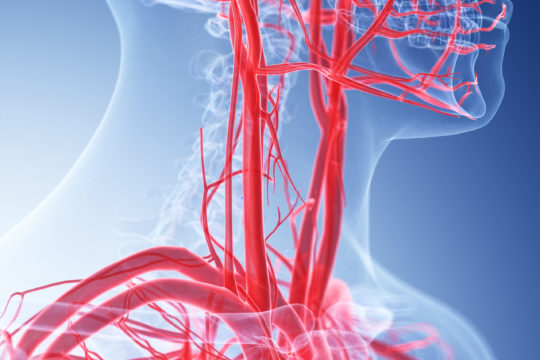Condition
 Carotid artery disease develops when the major arteries in the neck become narrowed or blocked by the buildup of fatty substances and cholesterol deposits called plaque.
Carotid artery disease develops when the major arteries in the neck become narrowed or blocked by the buildup of fatty substances and cholesterol deposits called plaque.
As this buildup increases, so does the risk for transient ischemic attack (TIA) and stroke. For those experiencing symptoms of ischemia (insufficient blood supply) that a blockage or narrowing of the arteries causes, The Department of Neurosurgery at Rhode Island Hospital offers advanced treatments to prevent the development of TIA and stroke.
Symptoms
This condition may be present for a long time before symptoms appear. When symptoms do occur, stroke or brief stroke-like attacks (TIA) are common.
Carotid Endarterectomy
Carotid Endarterectomy is the traditional open surgical treatment for carotid artery blockages. In carotid endarterectomy, you will receive a local or general anesthetic. Your surgeon will make an incision along the front of your neck, open your carotid artery, and remove the plaque deposits clogging your artery. Then your surgeon will repair the artery with stitches or a patch made with a vein or artificial material (patch graft).
Carotid Stenting
During the carotid artery stenting procedure, a carotid stent (a small, metal mesh tube) is placed inside the carotid artery at the site of the blockage and provides support to keep the artery open. When the stent is released or “deployed” in the artery, the fatty plaque or blockage is compressed against the artery walls to improve blood flow and restore a normal artery diameter. The embolic protection device is removed and angiography is then performed to make certain the artery has been opened satisfactorily and that no debris from the plaque has traveled to the brain.
For patients who meet certain eligibility criteria and have not or are unlikely to respond to aggressive medical therapy, carotid stenting offers a safe and less invasive approach than carotid endarterectomy.